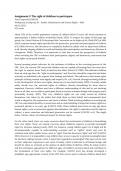Case uitwerking
Assignment 5 Health, Globalisation and Human Rights (AM_470818)
Assignment 5 about the rights of children for participation in the writing of the Convention on the Rights of the Child (CRC), which was mandatory for the workgroups.
[Meer zien]





